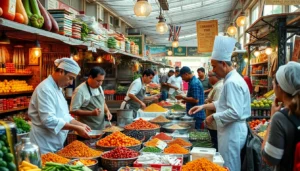Coffee culture isn’t just about that magical morning brew; it’s a vibrant tapestry woven from the rich histories and quirky rituals of coffee lovers around the globe. From the bustling cafés of Paris to the cozy corners of Seattle, each cup tells a story that invites everyone to join the caffeinated conversation.
Table of Contents
ToggleOverview of Coffee Culture
Coffee culture represents a rich tapestry woven from history, ritual, and social interaction. In countless cultures, coffee transcends its role as a simple beverage, becoming a focal point for community gatherings and conversations. Various coffee preparation methods, such as espresso in Italy or pour-over in Japan, showcase the diversity in techniques and traditions.
Distinct characteristics define coffee culture in different regions. In Ethiopia, coffee ceremonies celebrate the beverage’s origins and are deeply rooted in communal bonding. Conversely, the fast-paced coffee culture of New York City emphasizes convenience, with many opting for quick takes on their favorite brews.
Social connections also play a significant role in coffee culture. Coffee shops in urban areas often serve as meeting spots where individuals gather for work, study, or social interaction. Patrons engage with baristas, building a sense of community around shared experiences and flavorful creations.
Globally, coffee culture has evolved with trends, such as the rise of specialty coffee and sustainable sourcing. These movements encourage consumers to appreciate unique flavor profiles and support ethical practices within the coffee industry. Enthusiasts now explore distinct varietals and regions, elevating their understanding of coffee’s complexities.
In essence, coffee culture functions as a mirror reflecting societal values and local traditions. Each cup tells a story, celebrating the journey from bean to brew and forming connections between people, places, and cultures. Through rituals and interactions, coffee enthusiasts continue to cultivate a vibrant, ever-evolving appreciation for this cherished beverage.
Historical Context
Coffee culture has deep roots intertwined with global history. It represents a rich heritage that shapes social norms and customs associated with coffee.
Origins of Coffee
Coffee originated in the 15th century, primarily in the Ethiopian region of Kaffa. According to many historians, the first use of coffee beans occurred when local tribes discovered their energizing effects. Ensuing years saw coffee travel to the Arabian Peninsula, where it gained popularity in Yemen. By the 16th century, coffee houses known as qahveh khaneh emerged, becoming cultural hubs for social interaction, intellectual discussions, and artistic expression. These establishments significantly shaped the communal experience of coffee, laying the foundation for modern coffee culture.
Evolution of Coffee Consumption
The 17th century marked coffee’s introduction to Europe, where it quickly captured the attention of the elite. In England, coffee houses became known as “penny universities,” offering access to knowledge and conversation for the cost of a drink. By the 19th century, industrialization influenced coffee production and consumption patterns. Instant coffee appeared in the early 20th century, revolutionizing convenience. More recent trends favor craft coffee with an emphasis on sustainability and ethical sourcing. The transition reflects a growing awareness of the quality and origins of coffee, further enriching the overall coffee culture.
Global Coffee Culture
Coffee culture showcases diverse practices and rituals linked to this beloved beverage across the globe. Each region embodies its unique relationship with coffee, influencing social interactions and traditions.
Coffee Traditions Around the World
Ethiopian coffee ceremonies highlight community bonding through elaborate preparation and sharing of coffee. In Italy, espresso drinking rituals signify quick social interactions, showcasing a fast-paced lifestyle. Turkish coffee serves as a symbol of hospitality, where serving it to guests reflects respect. Japanese pour-over methods emphasize artistry and precision, enticing coffee connoisseurs with their elegance. Each tradition enriches the cultural tapestry of coffee.
Regional Variations and Preferences
North Americans gravitate toward convenience, favoring coffee-to-go and specialty drinks like lattes. In France, café culture thrives with social interactions predominantly occurring in sidewalk cafés. Brazil celebrates coffee as a national passion, with unique brewing methods like the coador. Vietnamese coffee offers an innovative twist, incorporating sweetened condensed milk for a rich flavor. Each regional preference illustrates cultural values and influences how coffee shapes daily life.
The Social Aspect of Coffee Culture
Coffee culture thrives on social connections, making it integral to community life. The interactions around coffee foster relationships and build familiarity among patrons and baristas alike.
Coffee Shops as Community Hubs
Coffee shops serve as essential gathering spots in urban and rural settings. They accommodate a variety of activities, from casual conversations to professional meetings. Many individuals use these spaces as workstations, enjoying the ambiance while being productive. Baristas often establish rapport with regular customers, creating a welcoming environment. These shops reflect the local culture and personalities of their neighborhoods. Beyond coffee, shops often host events, such as open mic nights and art exhibitions, bringing communities together. Patrons find themselves sharing experiences and stories, enhancing their connection to one another. Ultimately, the coffee shop becomes a vibrant microcosm of community life.
Rituals and Etiquette
Coffee rituals vary around the globe, embodying local customs and traditions. In Ethiopia, ceremonious preparation engages participants in a shared experience, emphasizing hospitality. Italian espresso emphasizes quick interactions, creating a balance of socializing and efficiency. Respect for coffee and its preparation forms a cornerstone of many cultures. Additionally, sipping coffee leisurely at a French café symbolizes appreciation for time and conversation. Certain cultures emphasize the importance of specific utensils, such as Turkish coffee served in small cups. These rituals contribute layers of meaning to coffee consumption, fostering appreciation between individuals and their coffee choices. Adhering to local etiquette enriches the enjoyment of coffee as a social activity, reinforcing bonds among individuals.
The Impact of Coffee Culture on Society
Coffee culture significantly influences various aspects of society, impacting economic practices and environmental policies.
Economic Influence
Coffee’s economic impact spans local and global scales. In many regions, coffee production represents a crucial source of income for farmers, contributing to the livelihoods of millions. The global coffee market, valued at over $100 billion, showcases immense growth opportunities. Specialty coffee shops generate revenue while creating jobs for baristas and other staff. Coffee tourism attracts visitors to regions known for their coffee production, fostering local economies. Additionally, ethical sourcing practices enhance consumer awareness and drive demand for high-quality products. Fair trade certifications create a sustainable framework for farmers, improving their economic stability.
Environmental Considerations
Environmental factors play a critical role in coffee culture. Coffee cultivation significantly affects land use and biodiversity. Sustainable farming practices, such as shade-grown coffee, help preserve ecosystems while promoting environmental health. Water usage in coffee production raises concerns about conservation, making efficient practices increasingly important. Moreover, climate change poses risks to coffee production, threatening crops and affecting flavor profiles. Advocates emphasize the need for environmentally responsible practices to mitigate these challenges. Educating consumers about sustainable coffee choices fosters a collective commitment to protecting the planet.
Coffee culture is a vibrant reflection of humanity’s shared experiences and traditions. It transcends mere consumption to foster connections and create communities. Each cup serves as a reminder of the rich histories and diverse practices that shape the way people enjoy coffee around the world.
As this culture continues to evolve, it embraces sustainability and ethical sourcing, encouraging a mindful appreciation of coffee’s journey from farm to cup. Whether it’s a bustling café in a city or a quiet corner in a rural town, coffee remains a powerful medium for storytelling and social interaction. Through these shared moments, coffee culture will undoubtedly continue to thrive and adapt, enriching lives and communities everywhere.


